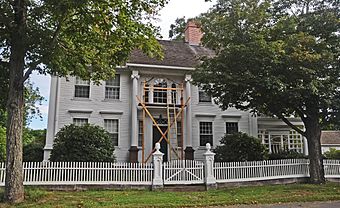Jonathan Warner House facts for kids
Quick facts for kids |
|
|
Jonathan Warner House
|
|

in 2016
|
|
| Location | 47 Kings Hwy., Chester, Connecticut |
|---|---|
| Area | 28 acres (11 ha) |
| Built | 1798 and 1924 |
| Architect | Warner, Jonathan |
| Architectural style | Federal |
| NRHP reference No. | 78002855 |
| Added to NRHP | December 19, 1978 |
The Jonathan Warner House, also known as Warner-Brooks House, is a historic home in Chester, Connecticut. It was built in 1798. This house is a great example of the Federal style of architecture. It was even featured in a famous book about old Connecticut homes. The house was added to the National Register of Historic Places in 1978. This means it's a special place worth protecting!
Contents
What Makes This House Special?
The Jonathan Warner House is a two-story building made of wood. It has a classic look with a roof that slopes on two sides. There are two chimneys inside the house. The outside walls are covered with overlapping wooden boards called clapboards.
A Closer Look at the Outside
The front of the house has a special design. In the middle, there are two tall, fancy pillars. These pillars reach up to the second floor. They hold up a small, flat roof over the main entrance. The front door itself has decorative flat columns on each side. There are also narrow windows next to the door. Above the main entrance, you'll see a beautiful Palladian window. This type of window has a large arch in the middle. It also has smaller, flat columns separating its sections. A carriage barn from the 1800s was moved to the property. It is now used as a garage.
Inside the Warner House
Step inside, and you'll find amazing woodwork. Many of the original fireplace mantels are still there. These are the decorative frames around the fireplaces. The main staircase also shows off beautiful craftsmanship.
Who Was Jonathan Warner?
The house was designed by Jonathan Warner himself. He oversaw its construction in 1798. He kept very detailed records of the process. We know what materials were bought to build and finish the house. Jonathan Warner was a rich farmer. He also ran the nearby Chester–Hadlyme ferry. Plus, he invested in shipping businesses.
A Famous Connecticut Home
This house is so well-preserved that it was shown in a famous book. The book is called The Early Domestic Architecture of Connecticut. It was written by an expert named J. Frederick Kelly in 1963. People believe the Jonathan Warner House looks a lot like another old mansion. That mansion was built earlier in New London.
 | Anna J. Cooper |
 | Mary McLeod Bethune |
 | Lillie Mae Bradford |



